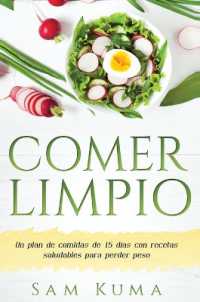- ホーム
- > 洋書
- > 英文書
- > Philosophy
Full Description
This book examines the turning point in modern philosophy in which Kant overcomes previous philosophical systems through his theory of imagination.
Cody Staton claims that Kant's decision to describe the imagination as mediating between the self and the world created an irrevocable philosophical standpoint. For Kant, since the imagination assists all the powers of the mind, it plays a critical role in the function of all philosophy. This applies to our ideas of God, the soul, the beauty that we experience in nature, the creation and enjoyment of art, and the very idea of life itself.
Contents
Acknowledgments
List of Abbreviations of Kant's Works
Introduction: A Schema for Philosophy
0.1 Reception
0.2 Structure
Chapter 1. Imagination: Critical Beginnings, 1770-81
1.1 Imagination in German Rationalism: Wolff and Baumgarten
1.2 Hume's Theory of Imagination and its Influence on Kant's Critique
Chapter 2. Schematism as Catalyst to Critical Philosophy
2.1 Time and Coordination in the Dissertation
2.2 Kant's Development of Time-Determination in the Duisburg Nachlaß
2.3 Tetens's Critique of Kant on Space and Time
2.4 Imagination and Time in the A-Deduction
2.5 The Categories and Their Relation to Time
Chapter 3. Transcendental Schematism
3.1 Imagination, Time, and Inner Sense
3.2 The Schema of Quantity
3.3 The Schema of Quality
3.4 The Schemata of Relation
3.5 The Schemata of Modality
3.6 Final Remarks
Chapter 4. Empirical and Mathematical Schematism
4.1 Mathematical Schematism
4.2 Kant's Dog: Empirical Schematism
4.3 Time-Images: Empirical Schematism as Image Production
4.4 Empirical Schematism as Concept Formation
Chapter 5. Imagination and Transcendental Objects
5.1 The Concept of an Object As Such (= X)
5.2 Transcendental Illusion and the Ideas of Reason
5.3 Kant's Account of Illusion: The focus imaginarius from Dreams to the First Critique
5.4 Reason's Imaginary Focus and the Transcendental Object
5.5 Reason's Regulative Pursuit of Imaginary Ideas
Chapter 6. Reflective Schematism: Imagination in Aesthetics and Teleology
6.1 Aesthetic Schematism and The Free Play of the Faculties
6.2 The Aesthetic Promotion of Cognition: From Imitation to Emulation and Evaluation
6.3 The "Failure" of Schematism in the Encounter with the Sublime
6.4 Organized Artists of Nature: Imagination and Teleological Judgment
Chapter 7: Moral Schematism: Imagination and Practical Reason
7.1 Moral Schematism
7.2 Imagining What I May Hope For
Conclusion: Philosophy as Imagining Nature a Second Time
Index








